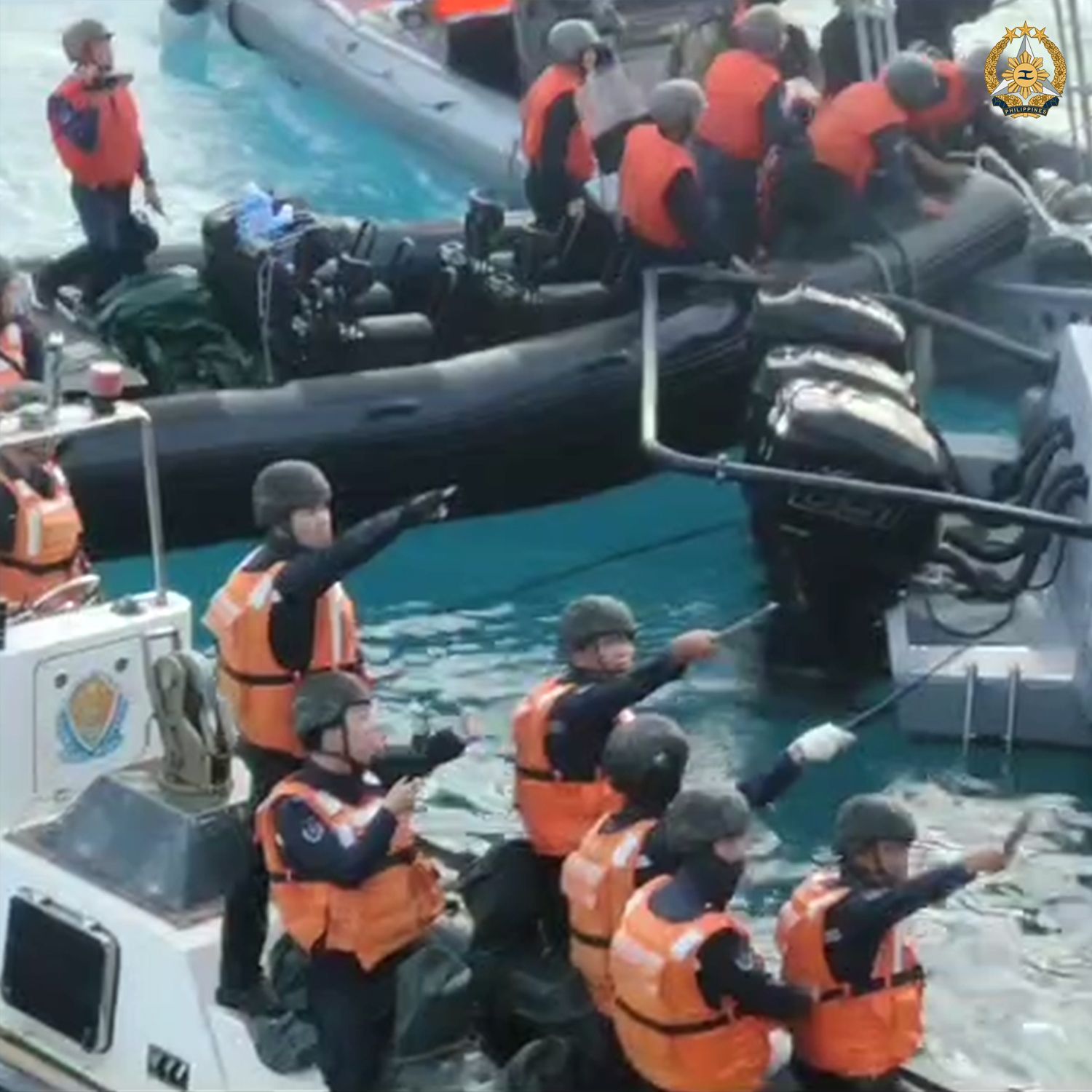Malacañang downplays encounter at Ayungin

China Coast Guard personnel brandish bolos against Philippine navy personnel during the June 17 resupply mission in a naval outpost in Ayungin (Second Thomas) Shoal. PHOTO FROM THE AFP
Malacañang on Friday tried to downplay the confrontation between Philippine Navy sailors and members of the China Coast Guard (CCG) early this week.
Despite what the military had described as “coercive, aggressive and barbaric actions” by the Chinese against a resupply mission to Ayungin (Second Thomas) Shoal on Monday, it was not an armed attack but a possible “misunderstanding or accident,” Malacañang said.
Four days after the assault on two of the Philippine Navy’s rigid hull inflatable boats (RHIBs), the Palace broke its silence and said the incident “can be easily resolved” and that there was no need to elevate it to a higher international body.
“Well, you know this was probably a misunderstanding or an accident. We’re not yet ready to classify this as an armed attack,” said Executive Secretary Lucas Bersamin in a hastily called press briefing in Malacañang on Friday afternoon.
READ: Chinese overwhelmed Filipinos at Ayungin
Bersamin, chair of the National Maritime Council (NMC), was responding to questions on whether the government considered Monday’s incident in the West Philippine Sea as an armed attack.
‘Unprovoked’
In a series of posts on X on Thursday night, one prominent maritime law expert, Jay Batongbacal, said the “unprovoked” use by the CCG of lethal weapons, tear gas, acoustic and visual disruptors, and physical violence against the Navy at Ayungin “clearly qualify” these actions as an armed attack.
Batongbacal, head of the Institute of Maritime Affairs and the Law of the Sea of the University of the Philippines College of Law, said the CCG men took these actions without “prior interactions” with Filipino sailors and that there was no warning before the Chinese began ramming the Navy supply boats, the latest in a series of attacks on a rotation and resupply (Rore) mission to Ayungin.
By the military’s reckoning, there were eight Chinese vessels deployed in the assault against only two Navy RHIBs.
“The unprovoked employment of acoustic and visual disruptors, hand-to-hand weapons, and physical violence against the Philippine Navy vessel and crew, clearly qualify as an armed attack and illegal use of force contrary to the purposes of the UN Charter, per Art. 2 (4) thereof,” he said.
‘Easily resolved’
A Filipino sailor’s thumb was smashed and severed in one of the many rammings by the Chinese coast guard of the boat he was on. The Chinese deployed tear gas as his comrades gave him first aid.
But Bersamin expressed his disagreement that these constituted an armed attack.
He said they saw the bolos and the axes, but “nothing beyond that.”
Andres Centino, presidential assistant on maritime concerns, said the NMC had not yet considered invoking the Philippines’ Mutual Defense Treaty with the United States following the incident.
Asked how the President reacted to the incident, Centino said Mr. Marcos “viewed this with concern.”
“The President has always been composed. Immediately he asked the concerned Cabinet secretaries to discuss the matter with him, that’s also the imprimatur why we had the NMC convened today,” Centino said.
Bersamin said that the government is also not yet looking at the possibility of bringing the incident to a higher international body.
READ: China Coast Guard seizes PH supplies for Ayungin
He said the Palace has yet to receive feedback from the Department of Foreign Affairs on its communication, if any, with China following Monday’s incident, but stressed that “reaching out is always a means to look at the situation, to resolve any pending issues or concerns.”
“I think this is a matter that can be easily resolved by us, and if China wants to work with us, we can. We’ll work with China,” Bersamin said.
Batongbacal had argued that in taking such “inherently unlawful actions,” China “committed acts of coercion against another state, contrary to customary international law, for which it is also directly and unquestionably responsible.”
China’s illegal use of force and the deployment of Chinese warships and its militia forces in the West Philippine Sea contradicted its duty to settle disputes by peaceful means under the UN Charter, he said.
Under this Charter, all UN members must settle their disputes through peaceful means, ensuring that international peace and security “are not endangered.”
‘Dangerous and violent’
China’s unlawful actions, according to Batongbacal, may be subject to another United Nations Convention on the Law of the Sea (Unclos) arbitration proceeding with a request for provisional measures for compensation for damages.
“Other states should also consider carefully whether they still wish to be associated with such a dangerous and violent organization as the CCG,” he said. “Immediate suspension or abrogation of all kinds of cooperation and exchange arrangements with the CCG are warranted.”
READ: ‘Barbaric’: 2 new reports of Chinese harassment
During Monday’s encounter, which happened right beside the BRP Sierra Madre, the military’s outpost at Ayungin, the CCG boarded the Navy boats and confiscated the sailor’s disassembled firearms, forcing the Filipinos to fight bare-handed.
The DFA denounced China’s “illegal and aggressive actions” in the West Philippine Sea.
According to Batongbacal, all Philippine Navy vessels qualify as warships as defined in Article 29 of the Unclos.
As warships, these boats are “endowed with sovereign immunity” under Unclos and therefore are “not subject to visit, boarding, inspection, search, or seizure” by other states, under customary international law and treaty law, he said.
For comprehensive coverage, in-depth analysis, visit our special page for West Philippine Sea updates. Stay informed with articles, videos, and expert opinions.


















